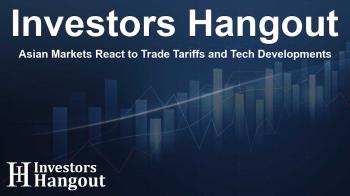Asian Markets React to Trade Tariffs and Tech Developments

Impact of Trade Tariffs on Asian Stock Markets
Most Asian stocks experienced a decline recently, primarily due to the influence of trade tariffs imposed by U.S. President Donald Trump on Colombia. This decision instilled a sense of uncertainty within the market, raising concerns about the potential for similar actions against other nations.
Chinese stock markets, however, presented a mixed picture as investors showed interest in local technology stocks amid growing excitement surrounding DeepSeek R1. This new artificial intelligence model is garnering attention for its promise to transform the technology landscape.
Notably, the market’s enthusiasm was tempered by disappointing purchasing managers index (PMI) data, which revealed a continued slowdown in China’s economic activity. This unexpected downturn served as a reminder of the fragile state of economic recovery.
Chinese Technology Stocks and AI Developments
In Hong Kong, the Hang Seng index stood out among other Asian markets by gaining 0.6%, driven by a surge in major internet stocks. Companies like Baidu, Alibaba Group, and Tencent Holdings saw significant increases, ranging from 0.9% to 3.5% in their stock prices.
The positive sentiment surrounding Chinese tech stocks was significantly bolstered by the debut of DeepSeek R1. This large language model is positioned as a competitive alternative to popular models from OpenAI and Meta, yet it comes at a fraction of the cost, enhancing expectations for Chinese tech companies’ capabilities in AI.
Despite recent gains, major semiconductor manufacturers like Semiconductor Manufacturing International Corp and Sunny Optical Technology experienced a pullback on profit-taking activities after a strong week. The broader picture showed that key indices such as the Shanghai Shenzhen CSI 300 and Shanghai Composite were only slightly up, reflecting caution amidst the mixed economic signals.
The latest PMI data pointed to a contraction in manufacturing and a slowdown in non-manufacturing sectors, which complicates the outlook for China's economy. Even with recent government measures to support the economy, the impact of rising trade tensions with the U.S. could exert further strain on growth.
Regional Market Reactions to External Pressures
Throughout Asia, markets reacted cautiously ahead of several national holidays. The recent trade developments, particularly Trump’s tariff actions, sparked fears of broader implications, including potential tariff threats directed at Canada and Mexico.
Japan saw a slight decline as the Nikkei 225 dropped 0.4%, although other indexes like the TOPIX reported modest gains. In contrast, Singapore's Straits Times index fell 0.3%, while South Korea's KOSPI remained relatively stable.
The Indian market anticipated challenges with futures suggesting a weak opening as upcoming key events, including major earnings and budget discussions, loomed on the horizon. Meanwhile, Australian markets were unable to participate due to a national holiday.
Looking Ahead: Market Sentiment and Federal Reserve Developments
As regionally, the focus also turned towards the upcoming Federal Reserve meeting, where markets expect a steady stance on interest rates. The collective market sentiment is a reflection of both local and international dynamics, with significant attention on how external factors could impact the economic landscape moving forward.
Frequently Asked Questions
What were the main factors affecting Asian stock markets recently?
The recent decline in Asian stocks was largely influenced by Trump's trade tariffs on Colombia, raising concerns about potential future tariff actions against other countries.
How did Chinese markets react to AI developments?
Chinese markets showed mixed reactions, with certain technology stocks rising due to excitement around the DeepSeek R1 AI model, even though PMI data indicated economic contraction.
Which companies positively impacted the Hang Seng index?
Heavyweight internet stocks like Baidu, Alibaba, and Tencent contributed to the Hang Seng index's 0.6% rise, reflecting investor confidence in the tech sector.
What does the recent PMI data indicate for China?
The PMI data suggested a contraction in both manufacturing and non-manufacturing sectors, pointing to challenges for China's economic recovery despite government support measures.
What should investors watch for in the coming weeks?
Investors should keep an eye on the outcomes of the Federal Reserve meeting and upcoming economic events such as earnings reports and budgets in various countries to gauge market trends.
About Investors Hangout
Investors Hangout is a leading online stock forum for financial discussion and learning, offering a wide range of free tools and resources. It draws in traders of all levels, who exchange market knowledge, investigate trading tactics, and keep an eye on industry developments in real time. Featuring financial articles, stock message boards, quotes, charts, company profiles, and live news updates. Through cooperative learning and a wealth of informational resources, it helps users from novices creating their first portfolios to experts honing their techniques. Join Investors Hangout today: https://investorshangout.com/
Disclaimer: The content of this article is solely for general informational purposes only; it does not represent legal, financial, or investment advice. Investors Hangout does not offer financial advice; the author is not a licensed financial advisor. Consult a qualified advisor before making any financial or investment decisions based on this article. The author's interpretation of publicly available data presented here; as a result, they should not be taken as advice to purchase, sell, or hold any securities mentioned or any other investments. If any of the material offered here is inaccurate, please contact us for corrections.
